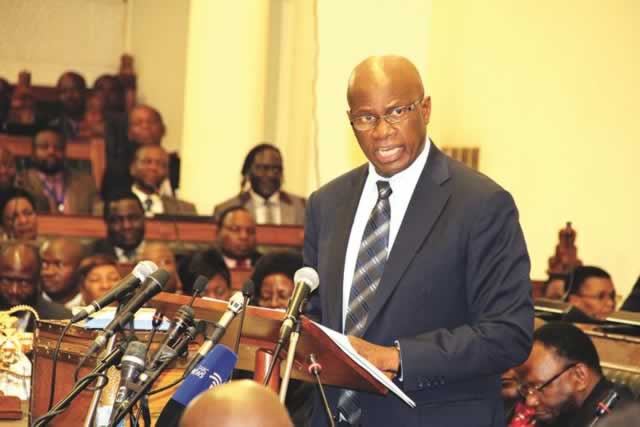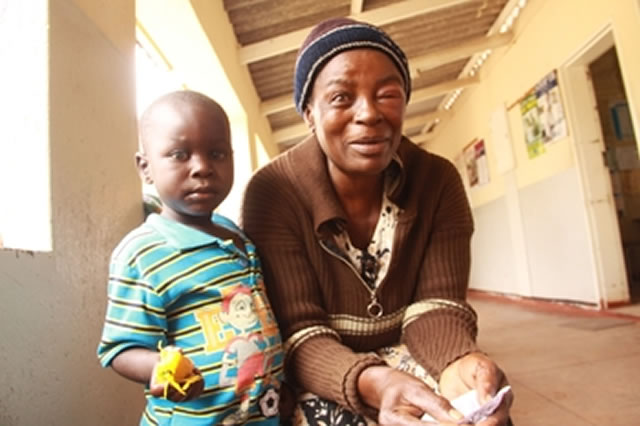Goodbye to hung Parliament


Finance Minister Patrick Chinamasa presents the 2014 National Budget statement in the august House on December 19 last year. The July 31 elections ushered in a different composition with Zanu-PF commanding over two-thirds majority, making it possible for the revolutionary party to pursue the developmental agenda without hindrance from the opposition
Lloyd Gumbo Herald Reporter
The inclusive Government era proved that where polarisation blooms, meaningful discussions wither.
Zimbabwe’s Parliament in 2013 was characterised by polarisation along party lines as had become the major characteristic of the august House since the MDC came into the picture following the 2000 general elections.
Since the turn of the millennium, no party has had a clear majority in the House until the July 31 2013 harmonised elections.
As a result, legislators from the previous parliaments would squabble and bicker along party lines or ideology, irregardless of the importance of the debate.
The inclusive Government era was no different as there was a hung Parliament, in the process frustrating Bills or motions introduced by members.
Consensus on issues among Zanu-PF, MDC-T and MDC in the Seventh Parliament in 2013 was erratic.
One notable time they had an agreement was on the passage of the Constitution Amendment (No 20) Bill on May 9.
The National Assembly had 35 sittings between February 5 and June 27 in the year, compared to 22 times it has sat after the harmonised elections from September 3 to December 19.
On the other hand, the Senate sat for the same number of days – 23 – between February 5 and June 27 and September 3 and December 19.
Some of the reasons why the two Houses sat for those few days in six months compared to the many days in four months was due to lack of funding to the legislature, a situation that resulted in the State owing then legislators outstanding allowances.
Acting Clerk of Parliament Mr Kennedy Chokuda said there were positives and negatives for the House in 2013.
“The major highlights for 2013 are the referendum that was held in March following the adoption of the report of the Constitution Select Committee that was set up by Parliament to develop a new constitution of Zimbabwe,” said Mr Chokuda.
Watch the video below
“After adoption of the constitution at the referendum, we had the Constitution Bill now to enact it into an Act of Parliament which was done in May this year leading eventually to the elections that were held on July 31. So we had that element of bringing in of a new constitution which is a major achievement for this Parliament.”
The elections ushered in a different composition with Zanu-PF commanding over two-thirds majority making it possible for the revolutionary party to pursue developmental agenda without hindrance from the opposition who have had a significant stake since its formation.
Zanu-PF has 197 and 37 National Assembly and Senatorial seats respectively while the MDC-T has 70 and 21 respectively.
The MDC has two seats apiece in both the National Assembly and the Senate.
Cde Jacob Mudenda was elected National Assembly Speaker while Mutoko North MP, Cde Mabel Chinomona was voted as his deputy.
In the Senate, Cde Edna Madzongwe was retained as president while Mashonaland Central Senator Cde Chakezha Chenhamo Chimutengwende was elected to deputise her.
Mr Chokuda said there were four Bills that awaited gazetting while three more were on the roll to be aligned with the new constitution.
While a hung Parliament is healthy for any thriving democracy as it is supposed to create room for progressive discussions, ours has defied all odds because of polarisation.
Instead bickering, name calling and squabbling became order of the day.
The inclusive Government era proved that where polarisation blooms, meaningful discussions wither.
It is for that reason that Zimbabweans must be grateful that now there is a two-thirds majority in Parliament meaning there is no excuse for failing to deliver on the legislative agenda.
Southern African Parliamentary Support Trust (SAPST) executive director Mr John Makamure said the Eighth Parliament has not done much in terms of considering and passing Bills.
SAPST is a think-tank that monitors the work of Parliament.
“The most important legislative matter is alignment of various laws with the new Constitution. There is a motion before the National Assembly that was moved by the MDC-T’s Innocent Gonese calling on the Government to move with speed in aligning laws with the new Constitution. Such a motion, in my view, is of paramount importance and deserves support from across the political divide,” said Mr Makamure.
Zanu-PF Chief Whip Cde Jorum Gumbo said 2013 did not do enough in legislative mandate because of the constitution-making process and electioneering ahead of the July 31 polls.
“In the first six months of 2013, there was anxiety among MPs because of the constitution-making process because it was inevitable that after adoption of the Constitution we would go to the elections.
“That affected the work of MPs until the automatic lapsing of Parliament on June 27. Funding is another problem that constrained legislators from performing their duties because they could not perform their oversight roles through portfolio committees,” he said.
Cde Gumbo said election petitions by MDC-T after the July 31 polls also stalled inauguration of the new Government resulting in delay of the official opening of Parliament.
President Mugabe officially opened the First Session of the Eighth Parliament on September 17 – about one and half months after the harmonised polls.
“That resulted in delay of alignment of existing laws to the new Constitution. However, President Mugabe instructed all ministries to identify Bills that they were supposed to introduce to align them to the Constitution,” said Cde Gumbo.
But his MDC-T counterpart, Mr Innocent Gonese, was singing from a different hymn.
“In terms of legislative agenda, we failed to achieve what had been set out in the Global Political Agreement. For instance, we did not establish the land audit commission, we did not do reforms in POSA (Public Order and Security Act), AIPPA (Access to Information and Protection of Privacy Act) and the Broadcasting Act. Those are unfortunate developments.
“We had very little legislation during the inclusive Government due to lack of cohesion since the three parties had different philosophies.
“We are having the same problems in the Eighth Parliament because it appears the Executive is not keen to harmonise all existing laws so that they can be consistent with provisions of the new constitution,”said Mr Gonese.
He said passage of Constitution Amendment Bill (No. 20) was one of the positives of the legislature in 2013.
Officially opening the First Session of the Eighth Parliament in September, President Mugabe outlined 14 Bills set to be debated during this session in pursuance of sustained economic recovery and growth.
Some of the Bills include Land Commission Bill, Banking Act Amendment Bill, Consumer Protection Bill, Mines and Minerals Bill, Tripartite Negotiating Bill and Sovereign Wealth Fund Bill among others.
Legislators from across the political divide have also introduced motions in both Houses.
Understandably, MDC-T being the opposition, introduced most of the motions with same objectives in both the Senate and the National Assembly.
In the Upper House, MDC-T’s Senator Misheck Marava introduced a motion calling on the Government to expedite harmonisation of existing laws with the Constitution – a duplicate of the motion that was introduced by Mr Gonese in the Lower House.
MDC-T Senator for Midlands Mrs Lilian Timveos brought a motion calling on Government to come up with a clear policy on cancer in respect of awareness, counselling, screening, treatment and charges to be levied on patients.
Zanu-PF representative in the Upper House Cde Tambudzani Mohadi introduced a motion in reply to President Mugabe’ speech when he officially opened the First Session of the Eight Eighth Parliament.
The same motion was introduced in the Lower House by Chikomba East legislator Cde Edgar Mbembwe.
In the Lower House, MDC-T legislator and former Deputy Prime Minister Ms Thokozani Khupe introduced an almost similar motion though she emphasised on the need for the introduction of a cancer levy.
Other motions in the Lower House include one by Zanu-PF legislator for Mberengwa East Cde Makhosini Hlongwane calling on Zimbabwe’s Parliament to submit a motion calling for the lifting of the illegal sanctions on Zimbabwe by the European Union and the US government.
Other highlights of the current Parliament were space constraints as the National Assembly has a holding capacity of 160 people yet the House is composed of 270 legislators.
To that end, MDC representative Ms Priscilla Misihairabwi-Mushonga moved a motion seeking Presidential intervention to move sitting to alternative venues.
The other highlight was the recalling of Bikita West legislator Munyaradzi Kereke by Zanu-PF arguing that he had been elected under the revolutionary party’s ticket.
His expulsion was, however, nullified by the Constitutional Court following an out-of-court-settlement agreed upon by Dr Kereke’s lawyers and those acting for Zanu-PF.
Feedback: [email protected]








Comments